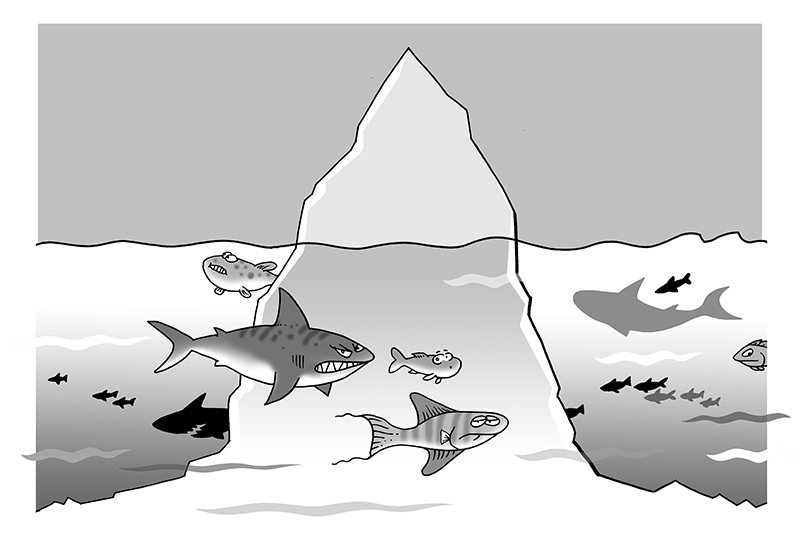Inclusion sounds simple, but how do you make it happen?
24 January 2023
Inclusion. Co-creation. Nice words, but how do you achieve these in an unruly reality? All voices are meant to be heard around the table at THUAS. But what if there are tensions in a team?

Deep democracy can help with difficult conversations
Inclusion. Co-creation. Nice words, but how do you achieve these in an unruly reality? All voices are meant to be heard around the table at THUAS. But what if there are tensions in a team? When things continue to fester because they are not addressed? In those cases, the method of deep democracy can make inclusion happen. A conversation with Froukje Jellema and Ellen Noordam. Prepare to get your feet wet. We move above and below the water; we talk about fish that can become sharks.
Froukje is a teacher trainer and programme coordinator at The Hague Center for Teaching and Learning (HCTL). It was her initiative to add deep democracy to the HCTL training programme. A team coach, Ellen Noordam uses this method that focuses on inclusive decision-making, co-creation, sustainable change and participatory and servant-leadership. All very important issues that resonate in the new THUAS Strategic Plan.
Wisdom of the minority
Froukje is convinced that deep democracy can foster inclusive conversations and inclusive education. This method can also help with difficult conversations in the classroom. She passionately teaches the two-day HCTL Deep Democracy training to anyone who is interested in the topic. In her team coaching, Ellen shows that this method works.
After a while, more people dare to come forward, to speak up.
“In many teams, we often see that two or three people always dominate the meetings. The others may be distracted or have checked out. They are thinking about the next meeting, a class or what they are having for dinner. To change this, deep democracy introduces ‘talk with your feet’. Everyone stands in a big circle. If you want to say something, you take a step forward. Those who agree with you also take a step forward. You don't have to say anything yet. After a while, you see more people having the courage to do this. They also take that step forward to say something. This is a way to break the dominance of a few, allow more voices to be heard and share the wisdom of the minority. This results in livelier and richer conversations”.
Undercurrent
Ellen explains the following: “It's fine if the content of a conversation is a bit abrasive, as long as the relations remain inclusive. Now, team members often think: well, that's how it goes, I will just keep my mouth shut. A team may appear very harmonious, but everyone is focused on themselves and stopped communicating a long time ago. They will vent their discontent in another environment. This is how an undercurrent gets started that may swirl for years and never come to the surface”.
Weather report
Froukje: ‘Deep democracy’ uses appealing imagery: talk with your feet, provide a weather report, the underwater sabotage line that may or may not become destructive. This includes making jokes or cynical, sarcastic remarks, gossiping and deliberately opposing things. This process will go from bad to worse: little fish (the jokes) grow into sharks (deliberate opposition). The exciting question is how to bring that undercurrent to the surface. How to make sure that small tensions (little fish) don't become big problems (sharks).
Imagine you are nervous in a group. You could ‘give a weather report’: I'm feeling a bit nervous, does anyone else feel this way? If that is the case, it provides an opportunity to name the undercurrent and bring it to the surface. If not, your feelings may be off or the group isn't ready yet to dive underwater and bring up the processes at play there".
Sabotage line
Ellen explains the following: “When something is alluded to three times in a conversation, it's not a coincidence or remarkable, but it indicates a pattern. As a coach I will ask: “Hey, do I see a fish underwater? Shall we bring it to the surface? If the team agrees, you initiate a dialogue. It may be uncomfortable, as long as it doesn't affect mutual relations. Deep democracy provides a safe language. You use easy, expressive words to have a difficult conversation”.
Deep democracy provides a safe language to have a difficult conversation.
Upstream, you look at how you want to reach the other side of the river, together as a team. But what happens in the undercurrent determines if you make it to the other side together. Ellen explains the following: “If there are too many fish in that undercurrent, and if those fish have become sharks, the underwater sabotage line becomes stronger. That undercurrent is there. Always. In every team. But as a team, you determine if that undercurrent becomes destructive”.
Slowing down
Froukje: “Deep democracy will initially slow down the team process. But with the right conversation, sooner or later you will see another acceleration. By slowing down, you become an inclusive team”. The Hague University of Applied Sciences does a lot to promote inclusion. Ellen explains the following: “Often this refers to minorities. With deep democracy, you bring to the surface whatever stands in the way of true inclusion”. Froukje: “So let's start having those tough conversations with each other. In your team and in the classroom. Find those difficult spots in yourself, in your team and in the classroom”. Ellen explains the following: “Not having those difficult conversations is more damaging to a team or a class than having the conversations. The situation will not improve by continuously avoiding something. Take the time together to make your team and your classroom more inclusive”.
Additional information
- Read more about the two-day training Deep Democracy from HCTL
- Read more about deep democracy and about the book Deep democracy; de wijsheid van de minderheid.